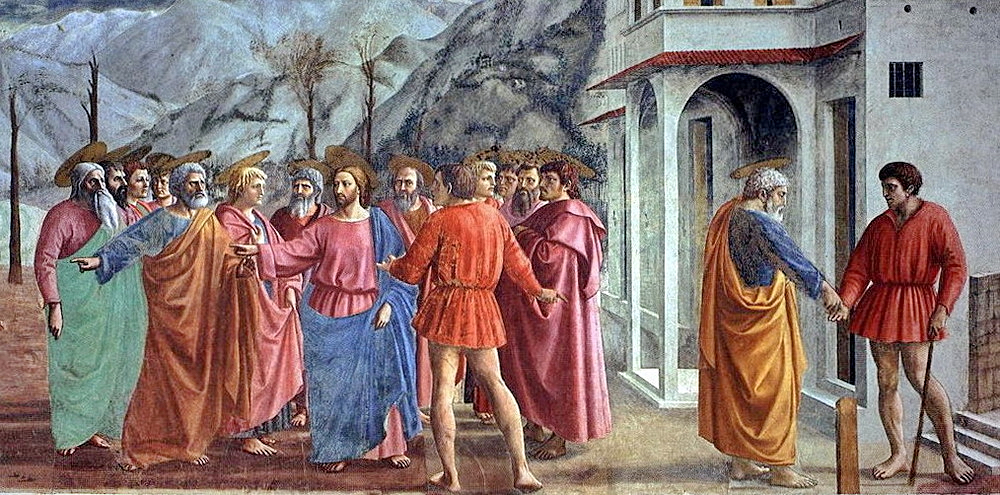Thoughts on Sunday’s Lessons for Oct. 22, 2023

The Tribute Money (1424), fresco by Tommaso di Ser Giovanni di Simone, known as Masaccio (1401-1428). Brancacci Chapel in the Church of Santa Maria del Carmine in Florence, Italy. (Click image to enlarge.)
First Reading (Track One): Exodus 33:12-23
Even when we the people stray from God’s way, our faith brings us back again to rest in God’s infinite capacity for forgiveness. Listen for this theme in Sunday’s readings. In our Track One first reading, the Lectionary planners have spared us a bloody and horrifying narrative that followed last Sunday’s passage about the people worshipping a golden calf: Their leaders were ordered to kill 3,000 of their brothers and sisters who had worshiped the idol. As we return to the narrative, God has relented, graciously agreeing to continue leading and guiding the people. Moses asks one thing more: To see God in God’s glory. But it would be fatal for Moses to see God’s face, so God stations Moses in a crack in a rock, protected from danger, offering only a glimpse from behind after God passes by.
First Reading (Track Two): Isaiah 45:1-7
The people have been in exile in Babylon for 40 years, dreaming of their lost city and temple. Isaiah and the other prophets had warned them that they had no one but themselves to blame for their exile. They had failed to love their neighbor, forgotten to care for the weak and needy, and thus broke the covenant with God that had brought them to the Promised Land. But now the Persians have conquered Babylon, led by the wise king that history knows as Cyrus the Great. Cyrus will allow the people to return home to Jerusalem. In celebration, the prophet sings high praise to Cyrus, celebrating the Persian Gentile king as God’s own anointed, a Messiah.
Psalm (Track One): Psalm 99
The Psalmist celebrates the story of the people’s flight from slavery in Egypt as told in Exodus. Psalm 99 celebrates God’s justice and equity. Its verses celebrate God’s having led the people in a pillar of cloud. God answered the people’s prayers and, while justly punishing them when they strayed, forgave them in the end. Proclaim the greatness of the Lord our God, we sing!
Psalm (Track Two): Psalm 96:1-9, (10-13)
Cyrus may have been a great king, as we heard in the Track Two first reading. But the Psalm that follows quickly reminds us that God is king among all kings, before whom the whole Earth trembles. God created all things and will judge all things, fairly and with equity, we sing. Heaven and earth, thunder and lightning, all the fields and all the forest will rejoice when God comes to judge in righteousness and truth.
Second Reading: 1 Thessalonians 1:1-10
Paul praises this small community of former pagans in Thessalonika in Northern Greece, who had been persecuted by Rome for having given up the state religion. Their faith, Paul said, had inspired many converts, who were now waiting for Jesus to rescue them “from the wrath that is coming.” Over the next several weeks we will hear more from 1 Thessalonians. Thought to be Paul’s first known letter, it was written perhaps 20 years after the crucifixion. At this time, early Christians still expected that Jesus would come back soon to judge the world and establish the kingdom of God on Earth.
Gospel: Matthew 22:15-22
This familiar story continues our recent narrative from Matthew: Jesus arrived in Jerusalem for what would be the final week before his crucifixion, and he quickly got in trouble. First he angrily threw the money changers out of the Temple. Then, in one encounter after another, he fences with the Pharisees who, in Matthew’s account, want to shut this trouble-maker down. Now they try to trap Jesus with a trick question, but he outwits them again. In his wise statement, “Give therefore to the emperor the things that are the emperor’s, and to God the things that are God’s,” Jesus leaves open the question of how much the emperor’s share might amount to. Thinking about the Gospels overall, though, that small coin alone may be Caesar’s portion. Jesus clearly points our priority toward God.
